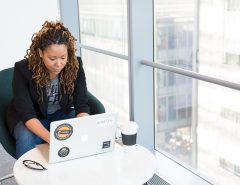If you want to get clients and job offers, people have to see your work. But as soon as your work goes online or out to potential clients, there is always a risk that someone will take it and use it as their own. This is where copyrights come in- copyrights protect your intellectual property, and give you recourse if someone does steal your stuff. Cara Dehnert Huffman, JD, spoke as part of our Freelancing Tool Kit Series this Monday and gave students basics on copyright law. A few highlights:
- You cannot copyright an idea, but you can create the expression of an idea. What does that mean? It means that if you talk about your idea for a movie about a boy wizard, this concept can not be copyrighted. But, if you write a screenplay about said boy wizard, that screenplay is your property. It can be registered with the government, and if anyone else tries to make that screenplay into a movie, they are infringing on your rights. Unless you give them the ok of course.
- Forget all of the bad government websites you’ve seen- copyright.gov is full of helpful information about copyrights. You own the copyright to your work as soon as you create it, but registering it through this website is the best way to prove it’s yours. Click on Circulars and Brochures for a list of guides by type of work. Timing is important when it comes to taking legal action, so register work as soon as it’s out to the public.
- Many of us infringe on copyrights everyday and often don’t realize it. Whenever you use a creation of someone else’s – including things like posting photos on your blog, or using a song in your reel- you are technically violating their copyright if they haven’t agreed to let you use it. Play it safe and always ask when you are using someone else’s stuff. Or connect with Creative Commons where artists have given permission to use their work for specified purposes. Fair use is a concept that allows you some leeway, but applies less often than you think.
- Things can get messy when you start to apply copyright law to different types of work. Be informed about your rights by exploring government resources and, if necessary, talking to a lawyer. Lawyers for the Creative Arts is a Chicago organization that connects artists with free or low cost legal advice. Having a lawyer as part of your professional team can help you navigate copyright and other legal challenges that arise.
This topic spans entire semesters in law school, so start by knowing the basics and knowing where to go if you hit problems. That was our last Freelancing Tool Kit workshop of the semester, but we have plenty of other good stuff happening. Don’t be a stranger.


